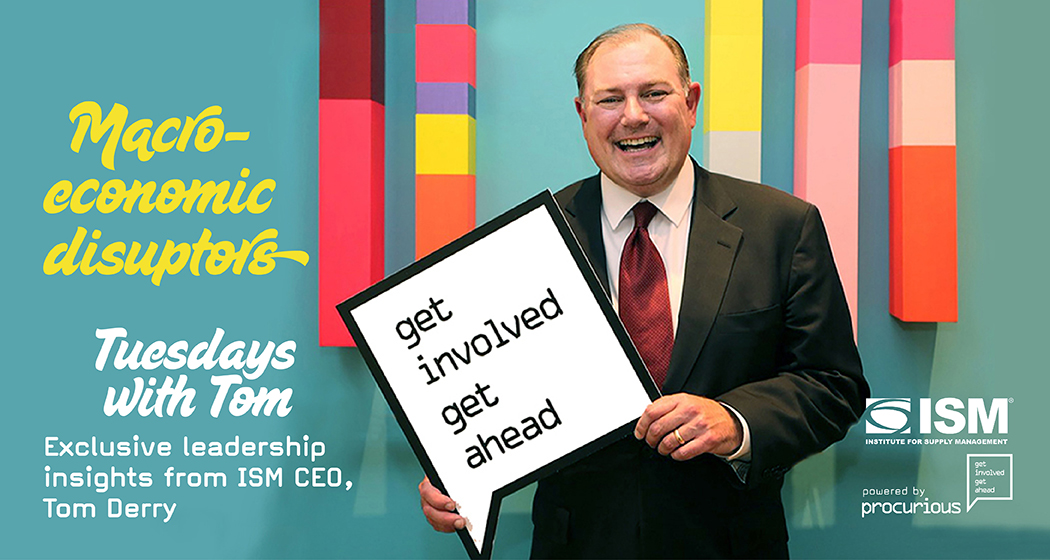Tuesdays With Tom: Trump, Trade and Turning Disruption into Opportunity
Institute for Supply Management CEO Tom Derry compares the Trump administration’s trade policies to “self-inflicted friendly fire” in the first of our 10-part Tuesdays with Tom podcast series.

“In military conflicts, one of the outcomes we most dread are instances of ‘friendly fire’, when you mistakenly fire on your own troops. I think the current [trade] policy is almost an instance of self-inflicted friendly fire, from an economic perspective. We might be helping domestic industries like steel and aluminum (although even that’s arguable), but we’re actually damaging the far bigger industries that are consumers of those products; who make household appliances, yellow goods for construction, or automobiles. All of our exports in those areas will suffer with this trade policy.”
In the first of our Tuesdays with Tom podcast series, ISM CEO Tom Derry talks with Procurious Founder Tania Seary about the current raft of trade wars and tariffs that have come about as a result of US policy shift.
Supply management professionals do NOT like trade wars
“ISM publishes economic reports every month for the manufacturing and services sector. Comments have been very consistent: we’re seeing suppliers trying to impose price increases on buyers as they’re buying metals (such as steel and aluminum)”, says Tom. “We’re seeing people anticipating the tariffs, looking to end sourcing from China and look for suppliers elsewhere, and we’re seeing people postpone investments.
“The two most important economic factors in deciding where to locate a manufacturing facility are local taxes and tariffs. If tariffs are uncertain, [companies are] going to postpone decisions about building that next facility, which is not good for the economy in the long run.”
NAFTA renegotiations having an impact
“What’s so interesting about these policy changes”, says Tom, “is that even mere discussion has a real economic impact and causes real dislocation of supply chains. Even before the steel tariffs were imposed, people reacted to the idea of tariffs, and that caused businesses to have to change their plans.”
Historically, NAFTA has resulted in incredibly tightly integrated supply chains in certain industries, particularly the automotive industry. “We do a lot of assembly of automotive in northern Mexico for final sales here in the United States or in Canada, but before you get to that final assembly in those plants, you’ve got components for parts that move across the Mexican/US border four or five times before we get to the final vehicle”, says Tom.
“Imagine what it would be like to impose tariffs in both directions four or five times, and the inspections that would have to go with it, and the country of origin verification that would have to be performed. If NAFTA [fails], it’ll be incredibly disruptive in terms of the auto industry here in North America.”
Two tips for turning disruption into opportunity
- Have a Plan B: “Every good category manger has a Strategy A for expected economic conditions, and Strategy B if there’s an economic downturn or something happens in the commodity markets. You have to have those playbooks thought through and scripted … if you haven’t done that, get to work on that immediately.”
- Be prepared to react fast: “If you see a dramatic change, you need to be able to respond to it in the moment. The advantage goes to the company, the organisation, or the individual who can react fastest during times of great change. If you’re late in moving, any potential benefit to be realised will be captured by someone else. Make sure you’ve got that playbook well defined.”
“The advantage goes to the company, the organisation, or the individual who can react fastest during times of great change.”
Tom tells the story of a CPO working at LG Electronics during the 2008-9 recession, who was concerned about securing semiconductors. They were aware that a recession would lead to a drop in consumer demand for electronics and hence a demand for semiconductor chips, so he visited his suppliers in Asia, then managed to convince his executive committee to buy $9 billion worth of semiconductors because the price would never be as low again. LG subsequently posted record profits for 2009 due to that CPO’s business acumen, his understanding of the spot market for semiconductors, and doing his homework. This is how you respond to disruptive events.
“[Procurement needs to] see through the common perception, recognise market opportunities and the dislocation between price and demand, and seize opportunities to turn a perceived threat into a great opportunity for a huge bottom line impact.”
Tuesdays with Tom is a 10-part podcast series featuring exclusive insights from ISM CEO, Tom Derry. Register now to receive an alert whenever a new podcast is released.